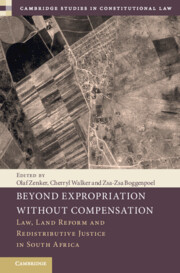Beyond Expropriation Without Compensation
Speeding up land reform through a constitutional amendment that would explicitly permit the expropriation of land without compensation has dominated legal and political-policy debates in South Africa in recent years. Taking this politically and emotionally charged issue as its starting point, this volume offers both expert commentary on this issue from a variety of disciplinary perspectives and also fresh ideas on how to advance the redistributive transformation that South Africa so urgently needs. It brings critically important debates around transformative property law, the need for diversified land justice and the possibilities of alternative forms of redistribution into productive conversation with each other. While grounded in the complex realities of South Africa’s past and present, the volume speaks to concerns that resonate in many contexts in the Global South and beyond. It will appeal to scholars, students, policymakers and general readers concerned with both the theory and practice of redistributive justice. This title is also available as Open Access on Cambridge Core.
Olaf Zenker holds a Chair of Social and Cultural Anthropology at Martin Luther University Halle-Wittenberg. His research has dealt with politico-legal issues such as statehood, bureaucracy, legal pluralism, inequality and land justice in South Africa and beyond. His latest publications include The Oxford Handbook of Law and Anthropology (co-edited with Marie-Claire Foblets, Mark Goodale and Maria Sapignoli).
Cherryl Walker is an Emeritus Professor of Sociology at Stellenbosch University. She has published extensively on land restitution in South Africa, gender and land rights in sub-Saharan Africa and women’s political mobilisation in twentieth-century South Africa. She served on South Africa’s Commission on Restitution of Land Rights between 1995 and 2000.
Zsa-Zsa Boggenpoel is a Professor of Law at Stellenbosch University. She specialises in property law, constitutional property law and property theory. She was awarded a C1 NRF rating in December 2022 and is therefore recognised as an established researcher in her field.

